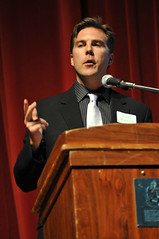
(Photo: Patrick Croasdaile)
Tom Miller, the former Chief of Staff for Portland Mayor Sam Adams who was appointed Director of the Portland Bureau of Transportation (PBOT) back in January, formally introduced himself to the Portland Bicycle Advisory Committee (PBAC) on Tuesday night.
His words offered a striking contrast from his predecessor Sue Keil (and in some regards, his boss, Mayor Sams Adams). He spoke of the bureau’s communication missteps, his intentions to put forward bold ideas and the political realities that those ideas will have to overcome.
“I think that recently the bureau has suffered and consequently the perception of bicycling has suffered… The bureau needs to own up to the fact that we haven’t managed communication as effectively as we needed to.”
Miller indicated to the committee that policy development would be central to his tenure at the bureau. He was quick to say that while he was passionate about transportation, policy creation and sustainability were what drove him most; “I’m interested in finding a balance for human existence, that’s the core of what makes me tick.” Miller added that traditionally and presently, “policy development within PBOT has been murky, and that needs to change.”
Regarding the impending changes at PBOT, Miller was remarkably frank:
“I have to be honest, I think that recently the bureau has suffered and consequently the perception of bicycling has suffered. A large part of this was the lack of effort the bureau has placed on communications. I believe very firmly that PBOT has done very well for bicycling in previous years, but its gotten tarred-and-feathered for it as well. The bureau needs to own up to the fact that we haven’t managed communication as effectively as we needed to.”
[Publisher’s note: Read more about PBOT’s communication problems in our 2010 overview of Mayor Adams and in the interview with him we published yesterday.]
“Some of the things we are going to propose will be controversial… but I think they are necessary to achieve the goals we’ve set for ourselves.”
To improve bureau communications, one of the first things Miller plans to do at PBOT is bring in a dedicated communications director (a position they haven’t had since 2006). “I come from a policy background and I want to be clear that on my watch, the transportation bureau is speaking very clearly about why it’s operating the way it is.”
On the matter of where bicycling infrastructure in Portland is headed, Miller is a solid supporter of separated facilities. He is concerned that too many advocates and planners had been “shoe-horning” bicycling into an auto-centric right of way.
Miller believes that if Portland is going to continue on as the premier city for bicycling, it’s going to need to place greater emphasis on separated facilities such as cycle tracks. He pointed to the examples in Northern Europe where “separated facilities are consistently present in cities with 25% and above bike mode share.”
To those interested in an auto-centric right of way, Miller had this to say:
“If you’re interested in what works for you, then advocate for the vehicular cyclist. I’m more interested in getting my neighbors and my wife riding a bike and I’ve tried every angle with them; I believe separated facilities are the only way to get the concerned cyclist riding more.”
Miller was very up-front about what the future might hold and what it would take to make his vision become a reality. “Some of the things we are going to propose will be controversial,” he told the committee, “there will be things you’re not going to like, but I think they are necessary to achieve the goals we’ve set for ourselves.”
Miller believes that in order to advance bicycling in a major way in Portland, there will need to be a large amount of politicking on its behalf; and getting politics lined up is a forté of Millers — he spent the last six years as Chief of Staff for Mayor Adams.
He pointed to the example of New York City. “New York has been very aggressive, and if you’re in my shoes, and you’re talking about a city that’s making big steps in making biking more mainstream, you have to be paying close attention to what’s happening in New York.”
“Your transportation director understands bike issues. I know bicycling’s place in the urban context and I understand that bicycling has arrived.”
But Miller maintains, and rightly so, that New York’s transportation culture and local political scene is vastly different than Portland’s. “I don’t think that the kind of change you’re seeing in New York is sustainable in Portland based on our commission form of government.” He wants bicycling infrastructure improvements to move faster and he’s certain that it’s better for the community in the long-run. “It’s not why to do it or whether to do it, it’s how to do it. Political reality is my stock and trade.”
Catching a brief word with Miller after the committee meeting, he maintained his belief that by clarifying how the bureau generates policy, the bureau will do better for the city. “The Portland effect [on transportation] is very real, but we have to be better about indicating what exactly that means to Portlanders as well as our city’s infrastructure.”
According to Miller, the good news for Portlanders is: “Your transportation director understands bike issues. I know bicycling’s place in the urban context and I understand that bicycling has arrived.”
But, given the state of local politics and the fact that Miller must first establish respect and credibility with PBOT’s 700 employees, he doesn’t expect major changes to happen overnight. “Time will tell what changes we bring to PBOT; I’m not going to turn it upside down right away.”
Miller is set to officially takes the reins at PBOT on May 1st.


